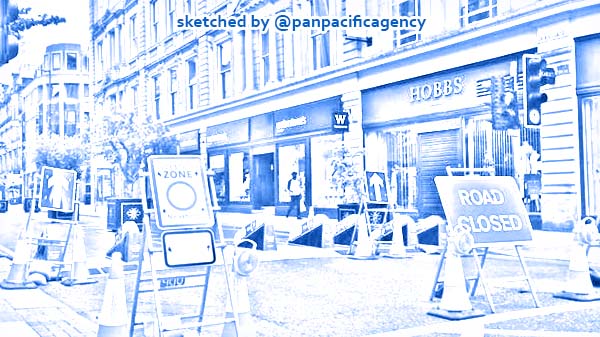[Analytics] How coronavirus is driving a revolution in travel

Road is closed. Deansgate during the Covid-19 lockdown: Manchester is creating new spaces for cycling and walking. Photo: BBC. Sketched by the Pan Pacific Agency.
Barriers closed a stretch of Deansgate, Manchester’s main thoroughfare, to motor vehicles on Saturday. Elsewhere in the city, new pedestrian walkways and pop-up bike lanes have appeared. It is part of a nationwide effort to create more space for social distancing as the country gradually begins to lift the coronavirus restrictions. Justin Rowlatt specially for the BBC.
Glasgow, Leicester, York and Brighton have also created new space for walking or cycling this week.
And dozens more UK towns and cities plan to do so.
On Friday, the Mayor of London, Sadiq Khan, said he would be shutting some of the busiest roads in the city.
He said his plan to close large swathes of London to cars and vans would create one of the largest car-free areas of any city in the world.
“Many Londoners have rediscovered the joys of walking and cycling during lockdown”, Mr Khan said. “By quickly and cheaply widening pavements, creating temporary cycle lanes and closing roads to through traffic we will enable millions more people to change the way they get around our city.”
He acknowledged that the changes would cause disruption for many Londoners but said he had no choice but to rapidly repurpose London’s streets for people.
“By ensuring our city’s recovery is green, we will also tackle our toxic air, which is vital to make sure we don’t replace one public health crisis with another.”
Most of the changes being brought in around the country are a temporary response to the coronavirus crisis, but many local authorities say that – following consultation with local communities – they would like to make them permanent.
“We hope that pedestrians and cyclists will reclaim the streets of this city”, councillor Angeliki Stogia, Manchester’s lead member for Transport and Environment, told the BBC.
The coronavirus crisis has allowed many projects to be fast-tracked.
“Some of the projects Manchester is introducing have been in the planning process for years,” she said.
The government has acknowledged that resolving how we can travel while maintaining social distancing is one of the biggest challenges it faces as it starts to lift the lockdown.
The current message is: don’t use public transport if you can avoid it, yet if people take to their cars, our streets will be choked with traffic.
Last week, the government announced what it called a “once in a generation” investment to change the way Britain gets around.
Transport Secretary Grant Shapps ordered English local authorities to make “significant changes” to give more space to pedestrians and cyclists.
He said he would be setting up a £250 million emergency fund to encourage what he called “active travel”.
Councils can already use temporary traffic orders to widen pavements, install cycle lanes, create new zebra crossings and close entire streets to traffic, and Mr Shapps has said he will enhance their powers.
It means local authorities have the ability to completely alter the way traffic moves through a town or city.
But most of the new measures involve restricting car and other motor vehicle access.
Some motorists see what is happening as a land grab, conducted under the cover of covid and designed to create “new facts on the ground”.
“What is worrying about this is that it feels anti-motorist, anti-cars, anti-lorries, anti-vans”, says Rod McKenzie of the Road Haulage Association.
“All those methods of transport are essential for economic recovery, so don’t punish one group at the expense of the other”, he urges.
Manchester has dubbed its campaign to encourage walking and cycling “Safe Streets Save Lives”.
The city says it will use £5m of emergency funding to introduce changes where they are most needed, so outside shops, transport hubs or on routes to hospitals.
The aim is that these initiatives will help achieve the authority’s goal of making the city carbon-neutral by 2038 as well as creating a healthier, more pleasant city.
The focus is not just on the city centre.
Levenshulme in south-east Manchester will see some of the most dramatic traffic calming measures in the entire region.
The plan is that 30 traffic filters made of heavy concrete flower pots and bollards will close much of the neighbourhood to through traffic over the next few weeks.
“We have consulted with the community and they say want to make this area a nicer place to live”, says Levenshulme resident Pauline Johnson.
She said the response from local people has been overwhelmingly positive.
“They say they want this to be somewhere where children can play safely in the streets.”
Greater Manchester’s cycling commissioner Chris Boardman, says cycling has increased by more than 70% on some days since the lockdown in the region.
“What coronavirus has shown is that if you give people safe, traffic free streets they will walk more and ride bikes”, he told the BBC.
“If we don’t take steps to enable people to keep traveling actively, we risk a huge spike in car use as measures are eased”, the Olympic gold winner said.
“Not only is it the right thing to do to protect people now, but it’s vital to meet our clean air goals and protect our NHS long-term.”
Lockdown has certainly prompted a boom in bike sales.
At one point this week shares in Halfords, the country’s biggest chain of cycle shops, had jumped 17%.
The company said sales of some cycling equipment had risen 500% since the government ordered us all to stay at home on March 23rd.
Ken Foster says his bike shop, Foster’s Cycles, in the Manchester suburb of Chorlton-cum-Hardy, is the busiest it has been since his grandfather opened it back in 1954.
But it has been exceptionally good weather.
What happens when it rains?
“There is no such thing as bad weather, only inappropriate clothing”, says Ken Foster with a laugh.